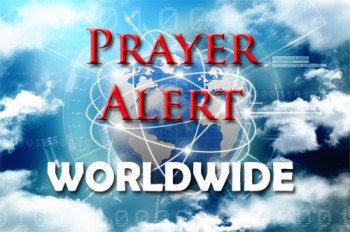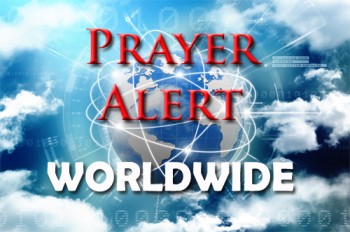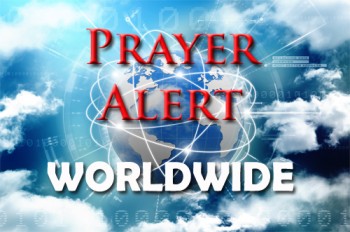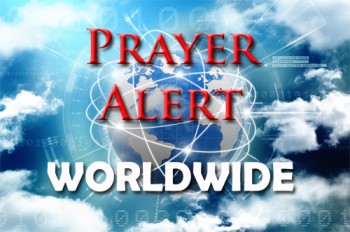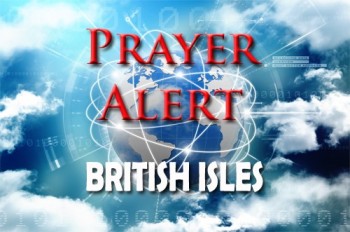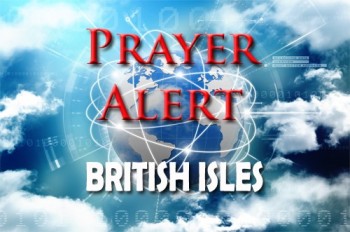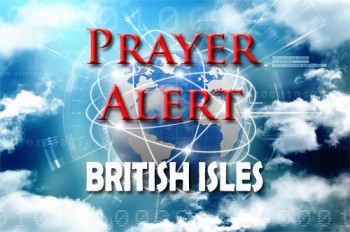
David Fletcher
David Fletcher is Prayer Alert’s Editor.
He is part of a voluntary team who research, proof-read and publish Prayer Alert each week.
If you would like to make a donation towards our running costs, please click here.
Azerbaijan’s major religion is Shia Islam. Churches developed in the wake of the Soviet Union’s dissolution. The economy is dependent on oil and gas, but corruption and an authoritarian government have impeded economic growth. Pray for President Aliyev and his government to provide solutions to widespread corruption and for Christians to address the country’s societal problems, including abortion. Families are the biggest persecutors of Christians in a shame-honour culture; those who leave Islam are considered to have brought shame on the family. The government also pressurises Christians with heavy fines. For many years, churches have been denied the ability to register legally. Secret police attend every church meeting and raid ‘illegal’ ones. The Old Testament and Christian literature are banned. Church leaders must now submit lists of members’ names; many think the information will be used later against congregations or pastors.
After Tehran admitted shooting down an airliner killing 176 people, thousands protested across Iran’s streets against the government, calling for heads to roll. Those marching toward Azadi Square were met by police in riot gear using tear gas and live bullets. Many died or were wounded because the Iranian mullahs are losing control and protesters reverted to violence. The difference between these protests and those over fuel prices which claimed 1,500 lives is that these demonstrations include students and middle class Iranians. Observers say this could lead to a real revolution. Meanwhile on 14,January, President Trump tweeted an encouraging message to the protesters, in Farsi (the Iranian language): ‘I have stood with you since the beginning of my presidency and my administration will continue to stand with you. We are following your protests closely, and are inspired by your courage.’ See also
Spiritual warfare and the mission of the church is woven into Pentecostal / charismatic Christianity as a form of pastoral care. Supporters of spiritual warfare call themselves charismatic prophets and create ritual context for dealing with the problems of life related to education, marriage, promotion, etc. Witchcraft, in particular, may be blamed for both personal and communal problems. It is not uncommon for Ghanaians to explain alcoholism as the result of the wickedness of family witches who seek to bring victims to ruin. Mental health and human reproductive problems are similarly explained as the work of evil spirits. In Pentecostal traditions, unless deliverance occurs through warfare prayers, the influences of evil are believed to continue until people’s lives are completely wrecked. This teaching does not call for ‘victims’ to be personally responsible for their actions.
Around 44 million people live in the Caribbean, three-quarters of them in Cuba, Haiti, and the Dominican Republic. Everywhere, the same stories are familiar themes - a legacy of colonial rule and slavery, a current story of fragility, inequality, and broken families. Some islands have very high rates of violent crime. In many countries there is a deep sense of God, and evangelical movements are growing. The most urgent and strategic need is for greater discipleship of the millions of Christians in the Caribbean. Pray also for church unity, for spiritual formation and discipleship, and for the churches to make an impact in society, particularly those with inroads to voodoo. Voodoo is the name for the religious practices of many Haitians; some prefer to identify their religion as ‘serving the spirits.’ See
For the first time since 1890 the full Pakistani Pashto Bible will be printed. The translation is in the major Yousafzai dialect of Pashto. Up to now missionaries and evangelists and the underground Pakhtun speaking Church only had a version of the New Testament in a mix of Pakistani and Afghan Pashto. This version, aimed at Pakhtuns living outside Pakistan, will be printed in Europe. It is hoped that the Bibles will be ready to transport to mission agencies in spring 2020. For security reasons, the name of the translating organisation is not available.
When Rachael Prescott was expecting twins she was advised six times to abort them after they were diagnosed with Down’s syndrome. She was inundated with condolences and health scaremongering because they also had heart conditions. Doctors were more concerned that the children might have Down’s syndrome than with their cardiac situation. They were pressurised for genetic testing and abortion. The Prescotts refused the tests and Charlotte and Annette had Down’s syndrome, but only Charlotte had a heart defect. Rachael said, ‘We hope in the future to direct expectant parents away from false preconceptions and towards what we have found to fill us with so much joy. We celebrate our twins.’ See also world article on abortion deaths.
He was an uneducated Maasai boy, expected to herd cows all his life. But when he was nine the boys in his village were told to attend school and he learnt about Jesus. His curiosity about faith grew. Next, he was sponsored through children’s charity World Vision; an overseas family supported him with simple and life-changing gifts. During a severe drought, World Vision fed the entire family. When the rains finally came, they helped them to grow their own food. Then his life truly shifted, and God took him on a journey he never could have imagined. To read his inspiring faith-filled story, click the ‘More’ button.
Islamic scholar and Christian Dr Antony McRoy said that there is something wrong in the basic philosophy of de-radicalisation programmes for terrorists; the London Bridge killings by Usman Khan are evidence of that. McRoy says that we are treating them as criminal offenders like serial car thieves or bank robbers, but we need to think a bit more like serial murderers or serial sex offenders who obviously have got something psychologically wrong with them. ‘But it's even more complex than that. These people are motivated by an ideology which says that the infidel, anti-Islamic West, is basically an agent of Satan, oppressing the Muslim world.’ He argues that the governments putting these programmes together represent a regime that its participants cannot get behind. ‘The people it is supposed to address are not going to take it seriously. These schemes cannot be effective without the supernatural intervention of God’ - like the transformation of the apostle Paul.
Boris Johnson said that the UK is in close contact with all sides to encourage de-escalation after Iran launched ballistic missiles at two US bases in Iraq in retaliation for their assassination of Quds Force commander Qasem Soleimani. This is a pivotal moment. Iran was bound to respond to the strike on Soleimani, and has done so in a fluid situation. Admiral Lord West said that the violent instability plaguing the region has just worsened; the world's best hope of averting conflict escalations with Iran lies with Britain. He said, ‘Our diplomacy and wise counsel could haul the world back towards safety.’ The Archbishop of Wales urged the Government to ‘make the strongest representations for calm and wisdom to prevail in the cause of peace which the world, in so many places, so desperately needs.’ See also the world articles on Iran.
Hospitals are putting vulnerable female patients with men on NHS mental health wards. 1,019 sexual assaults were reported by male and female patients between April 2017 and October 2019. 491 attacks were so serious that they required safeguarding action, with 104 incidents reported to police. Over the same period, just 286 cases reported on single- sex wards. The figures sparked calls for the Government to invest in mental health infrastructure where wards are out of date, forcing men and women to mix together. In 2018, the Care Quality Commission investigated concerns around sexual safety in mental health wards and identified 1,120 sexual incidents involving patients, staff and visitors between April and June 2017. Although ministers pledged to eliminate mixed NHS wards, a loophole in the rules means male and female patients can still mix without breaching the guidelines.

